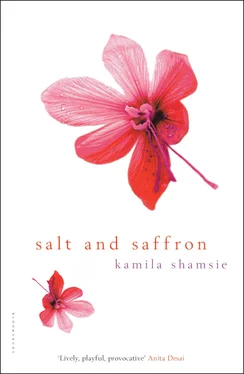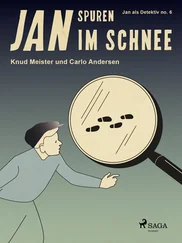‘Advancement without bloodshed.’ Dadi polished her solitaire ring with the puloo of her sari. ‘Unheard of at one time.’
‘Well, yes.’ I sat up. ‘At some point, when whatshis-name, the founder of Dard-e-Dil, swept down into India with his forces … Dadi, we were the nouveau riche.’
‘The word then was “marauders”. Actually, whatshis-name was a Timurid from Samarkand, so you’re wrong about him.’ Her tone suggested reproach, but this time I didn’t mind. She was reproaching me for having forgotten, if only for a minute, the stories of our family that she had so often told me, and in that reproach was an acknowledgement of all the hours we’d spent together. Dadi held her ring up to the sunlight and checked for smudges, then slipped it back on and tried to smooth out the wrinkles on her fingers. She grimaced, then smiled in resignation. ‘But go back far enough and, of course, we were all swinging from trees.’
‘So, we’ve had our turn. Power, wealth, the whole tamasha. Too bad we were born during the downward swing.’
‘That is our chief blessing. Now we can fade with dignity.’
‘A moment ago we were monkeys. Now we’re cloth. Milao -ing your metaphors, Dods.’
It was the old nickname that did it. She put her hand on mine, and absently scratched away the curve of nail polish that my swab with the polish-remover had missed. ‘Akbar knew my Marxist ideals — unformed and uninformed as they were — were based on a world that did not exist. In this world, the one we must live in, Baji will never fully belong to either side of her family. And if Mariam has a daughter, as beautiful and intelligent as Baji was when I knew her, you’ll never be able to forget that her father was a servant.’
I’d been wondering how I’d feel when she first mentioned Mariam Apa’s name. Sorrow, and an overwhelming physical exhaustion. And somewhere deep down, somewhere horrible, the nausea of knowing I agreed with her. It came to me then — that truth about why I’d tried so hard to hate her: when I told the story of Mariam’s departure … No, when I told my story of Mariam’s departure, I could allow myself to figure as the heroine. Here was the story as I’d told it to myself over and over and over: Mariam eloped with Masood and I was shocked to hear about it, but then Dadi walked in and called her a whore so I slapped Dadi because whoever Mariam might have married she was still Mariam and I would defend her against all those who couldn’t see beyond their own class prejudices.
Bravo, Aliya.
But I had felt something other than shock. When Aba told me she’d eloped I felt humiliation. Also, anger. Worse, I felt disgust. She’s having sex with a servant. Those words exactly flashed through my mind. Not Masood; just, a servant. How could I possibly have acknowledged that reaction as my own? So much easier to remember, instead, that I championed Mariam, seconds later. So much easier to say that in slapping Dadi I proved I did not think like her.
I felt a terrible emotion, too complicated for a monosyllable, well up inside me. I cried out, ‘But Dadi, at the end of the day can’t we at least hope to be better than ourselves!’
‘What we are, we are.’
I had planned to tell Dadi and my parents about Baji’s copy of the family tree over lunch, but just as we sat down at the table Sameer sauntered in.
‘Aadaab. Hello. Hi,’ he said, pushing me over so that he could sit on the edge of my chair. He raised an eyebrow, silently enquiring about my meeting with Dadi, and I rolled my eyes slightly and smiled. He seemed to understand what I was trying to say. I hadn’t forgiven and forgotten what she’d said four years ago; but I had remembered why, prior to her terrible words about Mariam Apa, I had adored her so completely. Of course, I now adored myself a lot less completely than I had a few hours earlier … but no, that wasn’t quite true either. At least now I could put my finger on why it was I had so often felt the urge to smash my fist through my reflection in the mirror in the weeks after Mariam left. But how much had I changed in the last four years? That really was the question. I had learnt to reclaim my old affection for Masood, and it had been a long time since I felt anger at Mariam Apa. But there was still that matter of Liaquatabad.
Sameer touched my ankle with his foot, to let me know how glad he was that things were approaching normality between me and Dadi, and he and my parents exchanged looks of relief. He raised my glass as in a toast, then thought better of it and turned to Dadi. ‘Abida Nani, Mummy was about to call but I volunteered to deliver the news, person-to-person. Some relative just had an ultrasound.’
‘Mini,’ said Dadi. ‘Booby’s daughter. Everything’s okay, I hope.’
Sameer spooned haleem on to my plate and sprinkled green chillis and ginger over it. ‘Twenty fingers and twenty toes.’
Aba rolled his eyes. ‘More twins.’
There had been much holding of breath a couple of summers ago when some random cousin whose existence I was only dimly aware of had an ultrasound which detected twins. I was back at college by the time the twins were born and Aba left a two-word message on my answering machine to announce the event: ‘They’re quite.’
Sameer tore a naan in two, and gave me one half. ‘The Starched Aunts are clearly thrilled because it gives them something to speculate about. Particularly since the father’s name is Farid. Short for Fariduddin, which is supposedly significant.’
Dadi jangled the little bell which was always placed within her reach when she ate with us. When Wasim appeared she said, ‘Quickly give my driver something to eat. Tell him we have to go to Booby Sahib’s house as soon as I’ve finished lunch. And didn’t you see Sameer Mian walk in? Set a place for him straightaway.’ Before he was out of earshot she said, still in Urdu, ‘I remember the days when servants were fired if their hands shook while they were serving food.’
Marx would have liked that. I decided to relay the thought to her telepathically and it must have worked because she paid me no attention.
‘There was a famous Fariduddin in your family, wasn’t there?’ Ami said. ‘Wasn’t he the twitchy one?’
‘No, the twitchy one was the necrophiliac,’ Sameer said.
Aba clicked his tongue. ‘The stammerer was the necrophiliac, and for the record he wasn’t a necrophiliac as such — he just had some difficulty accepting his wife’s death.’
‘I thought the stammerer and the twitchy one were the same person,’ said Ami.
‘I didn’t know there was a stammerer.’
‘Sameer, everyone knows there was a stammerer.’
‘Are the stammerer and the stutterer the same person?’
Dadi jingled the bell so softly I wouldn’t have heard it if I hadn’t seen it. When I was very young she had taken me to a kathak performance. It was my first experience of classical dance and I was transfixed by the sound of the ankle bells — the ghungroo — which accompanied the tabla and sitar as the dancer whirled and glided across the stage. Dadi, however, declared the performance amateur. A real kathak dancer, she said, such as the ones she remembered at the Dard-e-Dil court, did not rely on a ‘crowd-pleasing chhing-chhing’ of hundreds of bells. A real kathak dancer demonstrated mastery by isolating one bell from all those hundreds, through sheer muscle control, and ringing it with the clarity and purity that was lost in multitude. It was that way with family histories, too, she said. One could not simply say that our family was involved in battles and treaties, patronized poetry and dance, was sometimes generous and sometimes cruel. To say someone committed patricide and someone infanticide, that heads were severed and hearts broken, that there was great glory and also falls from grace, with no symmetry to the reversals unless chance has its own peculiar symmetry, to say all this is not enough. You have to isolate each life, have to say that here lies the first discordant note and look how it is echoed in this life and see the discordance transformed into a necessary part of the whole as it, through contrast, heightens the harmony of this chord.
Читать дальше












